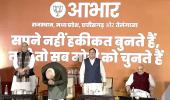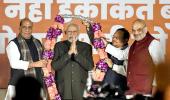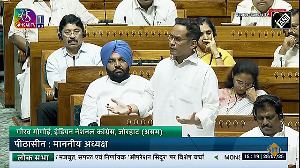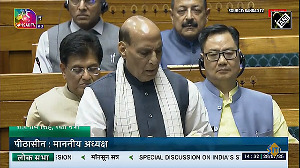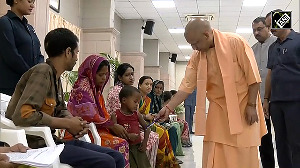The Congress needs to reorganise itself at the grassroots, infuse younger blood, and have more boots on the ground.
Just offering freebies is not the answer anymore, argues Ramesh Menon.

The results of the assembly election have many lessons for both political parties and campaign managers.
What was it that triumphed? It was ultimately diligent and aggressive campaigning, polarisation of new sections like tribals and scheduled castes, booth management, door-to-door campaigning by trained workers, personal contact with voters, and finally, the money power to do all this.
Voters were lured with freebies, showing that Indian democracy had a long way to go before it reached some level of maturity.
Before getting lured, voters did not think twice about how it would bleed their state's economy and push it into an unending whirlpool of debt.
Neither the Congress nor the Bharatiya Janata Party told voters how much the freebies are going to cost the exchequer, and finally, it would be the taxpayers money that would fund it.
Each party tried to outdo the other in terms of freebies.
One young voter in Rajasthan told a television anchor how she had decided to vote for the BJP as it was offering scooters to girls.
When told that the Congress was offering laptops, she smiled and said her father would get that for her but could not afford a scooter.
Having won Chhattisgarh, Madhya Pradesh and Rajasthan, the BJP is showing a new confidence with parliamentary elections scheduled next year.
It was not as confident when elections were announced.
It feared that Ashok Gehlot would steer Rajasthan back into the lap of the Congress.
So would Bhupesh Baghel in Chhattisgarh. In Madhya Pradesh, it wondered if anti-incumbency would end the Shivraj Singh Chouhan government.
It mounted an aggressive campaign with Modi as its face while drafting Union ministers to contest.
What, then, turned the tide? It was sheer hard work by the party that paid dividends.
Modi travelled to all the states that went to the polls numerous times to energise the party machinery and woo the electorate on how the BJP would dish out a new future for it.
Amit A Shah, the BJP's primary election strategist, tirelessly organised every bit of how the campaign should target every possible voter and got the party to do it at a grassroots level.
It reached out to tribals and scheduled castes to carve a new block of supporters.
In all the states, women and new voters were targeted.
What worked for the BJP was not announcing the chief minister if it won in all the states.
Factional heads vying for the post, therefore just concentrated on the party winning rather than destroying the chances of their rival.
Making Modi the face of the party helped as he was seen as one who was out to deliver.
Secondly, they focussed on welfare schemes, projecting the party as pro-poor.
One significant factor was a targeted move to woo tribals and women in every state.
It kept talking of how the Congress is out to appease minorities and had a list of corruption charges that the Congress governments in Rajasthan and Chhattisgarh could not effectively clarify.
Actions by the Enforcement Directorate against these two governments had already rendered them vulnerable and defensive.
Chhattisgarh

Baghel executed a fairly good reign. He helped boost agriculture and the rural economy and worked on engineering socio-economic reform.
He was overconfident, and so was the Congress machinery that it was easy to beat anti-incumbency.
That was the weak chink that the BJP spotted and put up an aggressive campaign wanting to win the state.
It sent a horde of Union ministers and BJP chief ministers with Modi as the chief campaigner.
Voters forgot about the eventful Congress regime when the BJP announced a higher purchase price for paddy and a loan waiver for farmers.
It offered to increase the support price of paddy to Rs 3,100 a quintal, procuring 21 quintals of paddy per acre, Rs 1,000 per month to married women, filling up 1.5 lakh vacancies, constructing 1.5 lakh houses and good governance.
The BJP revdi package suddenly looked better.
All packages were announced with a 'Modi guarantee', a term that gained currency.
Look at this strategy: In Chhattisgarh, the BJP got thousands of its workers to fan out in advance, getting beneficiaries to sign up forms for various schemes, giving them a feeling that the benefits would come to them as soon as the BJP government was formed. It worked, as the results show.
The Congress thought it would neutralise the BJP's offer by hiking the amount for married women to Rs 15,000 a year.
However, the work on the ground by the BJP lured the voters.
Just 72 hours before the state voted, Modi announced that the free foodgrain scheme that was started during the COVID-19 pandemic would be extended for another five years. This was a game changer.
The BJP also concentrated on polarising the tribal and the scheduled caste vote.It was a section that earlier voted for the Congress.
While Baghel's team had taken it for granted that its record of the last five years would be enough to sweep them back to power, the BJP high command left no stone unturned in planning the strategy to win, its selection of candidates and the overall game plan.
It tapped into local issues and made corruption a core issue, detailing various scams that had riddled the state, like the coal levy scam, liquor scam and the Mahadev app scandal.
Baghel, who was blessed with a massive majority in 2018, had everything going for him and could have won this time, too, had he been more adroit and not over-confident.
He had come to power riding on a social coalition comprising tribals and backward communities.
He paid little attention to them, helping the BJP to woo them easily.
The BJP will do all it can to consolidate itself in one of the few states where the Congress had a chance.
Rajasthan

In many ways, it was not a great surprise that the BJP won in Rajasthan as the state has never repeated a government since 1993.
Despite its numerous freebies and welfare schemes, the Congress succumbed to incumbency even when it had the potential to fight it.
The BJP gambled on denying seats to sitting MLAs and brought in new faces as their research showed that they would not do well as voters were critical about their lax performances, their arrogance, lack of work in their areas, and their connection with the populace.
They brought MPs like Rajyavardhan Singh Rathore to contest, to replace dropped sitting MLAs. It was a risky move, but the party went for it.
On the other hand, Ashok Gehlot retained many of his sitting MLAs whose popularity had dipped because of their poor performance.
Key ministers and many MLAs who needed to be replaced were not, as he was wary of experimenting with new faces, fearing they would turn against him after victory and back a leader like Sachin Pilot.
Out of Gehlot's 25 ministers who contested, only nine won.
Ironically, the BJP, in meeting after meeting, cited Pilot's public protests against his corrupt government, demanding that Gehlot take action against those accused of corruption.
That Pilot was eyeing the chief minister's chair was known to every voter. He was an eloquent rebel throughout the five years that Congress was in power.
This damaged the Congress's image, cutting into their votes.
Gehlot was an old war horse close to the Congress leadership and managed to stay on despite his age when a younger Pilot was waiting in the side wings.
Had the Congress effected a leadership change, younger voters may have stayed with the party.
The factional divide was patched up just before the polls to show a united face, and the superficiality of it could be seen by the electorate.
Factional fights also made the Gujjars look towards the BJP as they knew Pilot would possibly be ignored by the Congress again.
Then, there were scandals like the paper leak of public exams and corruption charges against individual Congress leaders, which ultimately took its toll as the Congress could not defend it.
The Congress lost 63 of its seats to the BJP.
The BJP also did not name former chief minister Vasundhara Raje as chief minister, keeping its options open wanting to go for a younger leader.
Instead of Raje, the BJP gambled on using Modi as the face of the party during the campaign.
He held numerous rallies, and so did Amit A Shah.
The BJP knew its stakes were high in the large northern state as and drafted in five of its chief ministers and a dozen Union ministers to campaign aggressively.
It was the BJP's way of countering Ashok Gehlot's numerous welfare schemes.
While the BJP attacked Gehlot's freebie strategy, it did not fight shy of listing numerous freebies in its manifesto-like subsidies of Rs 450 on gas cylinders, maximum selling price of Rs 2,700 per quintal for wheat, free scooters to meritorious 12th standard students, free school and college education for girls, a savings bond for every girl child, and Rs 1,200 to each student to buy bags and uniforms.
Gehlot's Indira Rasoi Scheme, which served a meal for eight rupees at community kitchens, helped many a hungry soul.
Lakhs benefitted from the Annapurna food packet scheme, where they got free wheat, dal, sugar, masala and cooking oil.
There was no shortage of welfare schemes to boast about, but Congress lacked the organisational capacity to micro-manage and showcase them effectively.
Both the Congress and the BJP were raining freebies to lure voters. Nearly 171,000 voters were in the 18 to 30 age group.
Around 25.2 million were women voters. First-time voters were 2.204 million.
While the Congress' central leadership allowed Gehlot to design and run his campaign, the BJP did precisely the opposite, with Modi leading a carefully planned campaign astutely managed that was overly aggressive as they wanted to win a perception war as Gehlot seemingly did not suffer from an anti-incumbency wave because of his numerous welfare schemes and freebies.
When Gehlot was offered the Congress presidency, he declined it, not wanting Pilot to get into his seat as it would edge him out of Rajasthan forever.
He excessively framed the campaign around himself, clarifying that he would continue to be chief minister after a win.
It was clear to the electorate that Pilot and him had no lasting truce.
Gehlot will be 77 when the next assembly elections are due, and it is unlikely that he will now be able to call the shots as calls for a change are already ringing.
The Congress lost an easy chance to buck the state's historical pattern of not voting the incumbent back to power. And it is itself to blame.
Madhya Pradesh

For Chief Minister Shivraj Singh Chouhan, winning Madhya Pradesh was no easy task.
Even in the last assembly elections, the BJP had lost to the Congress but managed to snatch power back after getting Jyotiraditya Scindia to cross over with 22 MLAs.
But once he came back into power, Chouhan who had been chief minister in earlier stints, did all he could to consolidate the party and strengthen its grassroots support.
His diligent work for the last four years paid off when the party won 163 of the 230 seats.
The debate is still out in Congress circles whether the party's fortunes would have been different had the party high command chosen to bring in a generational shift by installing a young, educated and dynamic leader with a mass following like Scindia as chief minister when it won the last assembly election in 2018.
Instead, the party installed Kamal Nath, who had much less public standing.
Had Scindia been made chief minister, he would have easily sailed through the last five years and probably won it for the Congress this time, too.
The BJP made rewarded him with an Union Cabinet post, and many others who crossed over with him were made ministers in the state. The Congress had lost its plot way back then.
While the BJP chose not to showcase Chouhan as the next chief minister and allowed its signature style of using Modi as the supreme leader of the party, the Congress stuck to Kamal Nath, who was not liked by many in the state party because of his arrogance and overbearing attitude.
He thought that anti-incumbency would help the Congress ignore the BJP's and did not pay attention to electoral strategy.
The central leadership had imposed an even more elderly leader, Digvijaya Singh, to help him, but they disagreed on a standard plank, and it was apparent to the voters and party insiders.
Both men could not match the combative BJP campaign that had 4.1 million registered workers at the booth level slogging to connect with the voters.
Amit A Shah had told them they must ensure a 51 per cent vote share in every booth.
One thing that worked was Chouhan's steadfast attention to making the state an agricultural powerhouse, winning the hearts of farmers.
He ensured that farming, agricultural produce, and irrigation coverage were allowed to grow and flourish.
In the last ten years, Madhya Pradesh has seen an average annual growth of 6.1 per cent when the national average was just 3.9 per cent.
Irrigation coverage was doubled in this period from 40 to 81.5 per cent. The state emerged as the second largest contributor to the central pool in agricultural produce.
Chouhan showed that he could credibly deliver welfare schemes, and the ones for women had considerable traction throughout the state.
He also worked on tribal welfare schemes, getting them to switch loyalties in this election.
Tickets to candidates were distributed earlier, giving them time to consolidate their strategy and plan.
As it licks its wounds, the Congress must be looking back at 2020 when Scindia quit the party just because they opted for Kamal Nath in his mid-seventies.
It did not need a political analyst to tell it that a generational shift to a younger and more decisive leader has dividends.
Madhya Pradesh has always been a BJP fortress right from the time of Rajmata Vijayaraje Scindia, and Chouhan has ensured that it will remain so, just like Gujarat and Uttar Pradesh.
Telangana

Telangana turned out to be the saving grace for the Congress as it wrested it from K Chandrasekhar Rao's Bharat Rashtra Samiti in a resounding manner.
Remember, the Congress had been pushed to its margins after the formation of Telangana as a separate state.
It ended regional identity politics based on the creation of the state.
KCR can no longer milk it, saying he was instrumental in getting statehood for the people.
After a decade, voters want good, clean governance.
Revanth Reddy, the Congress chief in the state, took on KCR as aggressively as he possibly could.
He did this with his loud campaign of labelling the BRS as a family-run party where the only focus was to boost family members' fortunes.
He also underlined rising corruption, unemployment, and economic stagnation in the state, which resonated with voters.
He fanned out into the state with other Congress leaders, personally engaging with the voters.
Reddy addressed around four rallies a day, leaving nothing to chance.
He used the anti-corruption platform in its most potent form.
His energetic personality geared up party workers to not allow BRS another term.
Reddy is Rahul Gandhi's choice. In fact, both of them kicked off their Telangana campaign five months ago in the United States talking to Telugu audiences about the vision of the Congress for Telangana, hoping that they would transmit it to their counterparts in the state.
They also asked for party funds, just the way the BJP does with its NRI supporters.
While the BRS was routed throughout the state, it swept the Greater Hyderabad Municipal Corporation limits.
It was no wonder, as KCR did a lot to develop Hyderabad into a modern city, building flyovers, link roads and underpasses to decongest the growing city.
There is a lesson here. Voters reward you if they see that you work for them.
That KCR was over-ambitious and saw himself as invincible was obvious.
He had changed the name of his party from the Telangana Rashtra Samiti to Bharat Rashtra Samiti as he had national ambitions of making it a national party and having a say in opposition politics.
With this election, his national ambitions have been stymied.
One of the main reasons for the party's collapse was the perception of how KCR was using the party to push family interests, using draconian laws to suppress dissent, inappropriate use of public money on vanity projects and patchy governance.
As KCR created targeted schemes instead of universal ones, it gave intermediaries scope to intervene, benefit some, and deprive others.
This created a constituency of voters who were denied benefits.
The Congress dove in to woo them successfully.
Revanth Reddy's campaign should teach dormant Congress workers in other states that fortunes can turn if one wholeheartedly puts one's shoulder to the wheel.
Reddy's main challenge in Telangana would be neutralising factionalism in the party and fulfilling election promises.
Mizoram

Other than the BJP sweep of three Hindi-speaking states, what stood out in the assembly election results was the rise of a new regional party in Mizoram, which galloped to power.
The Zoram People's Movement, formed in 2017, became a principal Opposition to the Mizo National Front, and a year later, it has won a comfortable majority, winning 27 seats in a 40-member House.
It is a coalition of six regional parties.
Led by Lalduhoma, 74, the ZPM has attracted youngsters and local celebrities all wanting a change in the tiny north-eastern state.
For decades, the state has seen Congress and the Mizo National Front governments.
This time, the ruling MNF won just 10 seats, and the Congress won a single seat, almost wiping out the party that once ruled the state for years.
There were other upsets, too, like Chief Minister Zoramthanga, 79, who lost to a ZPM candidate.
Lalduhoma, a former Indian Police Service officer, is now a phenomenon in the state.
His main thrust in the polls was the lack of development, the need for financial reforms, and allegations of corruption against Zoramthanga.
He said that he would not tolerate corruption and would grant the Central Bureau of Investigation permission to probe cases.
Lalduhoma has an uphill task of restoring the state's financial health as it has a fiscal deficit of over Rs 1,247 crore (Rs 12.47 billion).
The BJP, with two seats, wants to be a part of the new ZPM government, but it is unlikely that Lalduhoma will agree as he wants a free hand in shaping the future of Mizoram. He has a golden chance to do it.
Lessons for the Congress

While the BJP is upbeat about the coming parliamentary elections, the Congress has reasons to worry.
The INDIA coalition will now not allow the Congress an upper hand in deciding ticket distribution. It has already called for a meeting to discuss this.
With the Congress faring poorly, attracting parties like the Biju Janata Dal into its fold will take work. Even a stung BRS will be hesitant now.
The Congress will have to reinvent itself and realise that allies are important as it was seen what a newbie party could do with partners binding together.
Had the Congress tied up with parties like the Samajwadi Party and others in Madhya Pradesh, its vote share would have been much higher.
It is time for the central leadership to ask leaders like Digvijay Singh, Kamal Nath and Ashok Gehlot to retire and make way for a younger lot to take over.
It must learn from the BJP how new faces can help the electorate look at a party differently. Look at the results in Mizoram.
The Congress needs to reorganise itself at the grassroots, infuse younger blood, and have more boots on the ground.
Just offering freebies is not the answer anymore. Leadership matters.
Ramesh Menon, award-winning journalist, educator, documentary film-maker and corporate trainer, is the author of Modi Demystified: The Making Of A Prime Minister.
Feature Presentation: Aslam Hunani/Rediff.com
